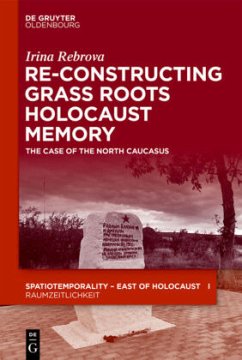The main objective of the book is to allocate the grass roots initiatives of remembering the Holocaust victims in a particular region of Russia which has a very diverse ethnic structure and little presence of Jews at the same time. It aims to find out how such individual initiatives correspond to the official Russian hero-orientated concept of remembering the Second World war with almost no attention to the memory of war victims, including Holocaust victims. North Caucasus became the last address of thousands of Soviet Jews, both evacuees and locals. While there was almost no attention paid to the Holocaust victims in the official Soviet propaganda in the postwar period, local activists and historians together with the members of Jewish communities preserved Holocaust memory by installing small obelisks at the killing sites, writing novels and making documentaries, teaching about the Holocaust at schools and making small thematic exhibitions in the local and school museums. Individual types of grass roots activities in the region on remembering Holocaust victims are analyzed in each chapter of the book.
Hinweis: Dieser Artikel kann nur an eine deutsche Lieferadresse ausgeliefert werden.
Hinweis: Dieser Artikel kann nur an eine deutsche Lieferadresse ausgeliefert werden.
"Rebrova's monograph [...] is an important contribution to the study of 'Holocaust' memory in the Soviet Union based on impressive research [...]. It will be of value for scholars on the North Caucasus and Russia more broadly." Miriam Schulz in: sehepunkte 10/2021
___
"Die Menschenrechtsorganisation Memorial, die Rebrova ebenfalls behandelt, wurde mittlerweile
aufgelöst. Es ist zu hoffen, dass die zivilgesellschaftlichen Erinnerungsaktivist:innen
ihre Arbeit fortsetzen können - mit ihrem Buch hat Rebrova ihrer Arbeit und ihren Initiativen
ein Denkmal gesetzt. Dies ist ihr großes Verdienst." Katja Makhotina in: ZFG 10/2022
___
"Die Menschenrechtsorganisation Memorial, die Rebrova ebenfalls behandelt, wurde mittlerweile
aufgelöst. Es ist zu hoffen, dass die zivilgesellschaftlichen Erinnerungsaktivist:innen
ihre Arbeit fortsetzen können - mit ihrem Buch hat Rebrova ihrer Arbeit und ihren Initiativen
ein Denkmal gesetzt. Dies ist ihr großes Verdienst." Katja Makhotina in: ZFG 10/2022








